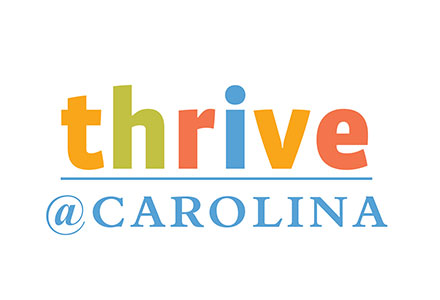A new way to Thrive
An innovative, holistic initiative called Thrive@Carolinaaims to raise graduation rates and help all students thrive at Carolina.

At the White House Summit on College Access and Success last year, Chancellor Carol L. Folt committed Carolina to doing more for its Tar Heels — particularly low-income, first-generation and underrepresented students.
Within six years, she said, the University wanted to increase its already-high graduation rates, with the aim of leading all public universities in the prestigious Association of American Universities.
At its heart, though, Folt’s commitment wasn’t just to raise graduation rates. It was to help all students thrive at Carolina.
Now an innovative, holistic initiative called Thrive@Carolina— coordinated by a group of faculty and staff members convened and charged by Provost James W. Dean, Jr. — aims to do just that.
Thrive@Carolina was developed by a group of faculty members and administrators in 2014 and the Retention Working Group developed the initiative, which works to provide students with the resources needed to achieve their goals at UNC-Chapel Hill.
Over the past year, several offices and departments across campus — including Diversity and Multicultural Affairs, the Office of Undergraduate Education, Student Affairs and the Office of the Executive Vice Chancellor and Provost — have collaborated to enhance coordinated support services to provide new resources aimed to help students better navigate their college education. Those new resources include student-success positions and transition courses for first-generation and transfer students.
“I’m really proud of what the Retention Working Group has accomplished – and continues to accomplish – with Thrive@Carolina,’’ Folt said. “Every student, no matter their background, deserves the opportunity to thrive at Carolina, and we owe it to every student to help them find success.”
Thrive@Carolina was built around the concept of honing students’ positive attributes and focusing on their strengths.
While most retention work is oriented on deficiencies and understanding why students are failing, Thrive@Carolina is working to understand excellence. It’s a shift in thinking that Cynthia Demetriou, the Associate Dean and Director of the Office of Undergraduate Retention and a member of the Retention Working Group, believes will make a big difference.
“It’s a different way to understand degree completion and retention at Carolina,” Demetriou said. “College should not be about survival. It should be about thriving.”
Utilizing this new approach, the Retention Working Group — which consists of faculty and administrators from various offices around the University — began identifying possible road blocks to success and determining where Carolina needed to step up its efforts.
While meeting each month, they realized they needed to create more student-success positions including a transition course coordinator, first-generation student support coordinator, a learning specialist and math specialists in the Learning Center, located at the Student and Academic Services Buildings.
“We’ve tried to take stock of where there were gaps, and where there are opportunities,” said Stephen Farmer, Vice Provost for Enrollment and Undergraduate Admissions. “We’re well on our way to developing better tools for advising and analyzing what’s going on with students to learn where we can help them.”
The Retention Working Group also launched transition courses aimed at transfer and first-generation students. Each course focuses on helping the students begin their time at Carolina on the right foot and helping them understand how the University operates.
“The purpose of these transition courses is to really demystify the University and to help people learn quickly what they probably would learn over the course of a couple years,” Farmer said.
The courses and new positions are just the first wave of improvements that Thrive@Carolina has implemented.
Farmer said the group is dedicated to finding more ways the University can create a successful environment for all students — one that challenges and supports every student, and one that gives all students the best possible chance of achieving their full potential and graduating on time.
“A great public university recognizes that not every great student is great in the same way or at the same time,” Farmer said. “Every student at Carolina belongs here, and every student has earned the right to be here. It is our job to help students get to where they want, and need, to go. It’s not our job to make everything easy for them. It’s not our job to lower our expectations. We need to be emphasizing to students that we expect the best of them. That’s what they have to give. In exchange for that, we offer the best we have to give.”




